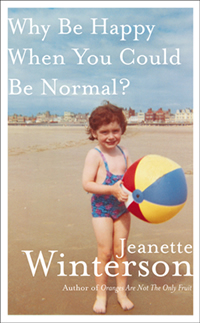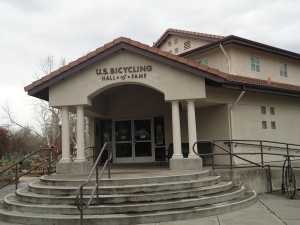An excerpt from Jillian Lauren’s memoir of adoption, Everything You Ever Wanted, is posted on the Adoptive Families website. I read and loved and recommend the book. Jillian Lauren’s voice is thoroughly engaging and real, and the story of becoming a mother through adoption is, of course, one of my favorite subjects. The AF website requires a log-in to read the excellent interview with the author, conducted by my friend Sharon Van Epps, but you should be able to access the excerpt here.
Posts Tagged ‘memoirs about adoption’
Book: Everything You Ever Wanted by Jillian Lauren
Friday, February 12th, 2016Book by Jeanette Winterson, “Why Be Happy When You Could Be Normal?”
Monday, February 11th, 2013 Two recent posts focusing on essays by people who are adopted—On Being a Super Adoptee and Learning by Listening: What is Adoption Savior Syndrome?—got me remembering Jeanette Winterson’s outstanding memoir, Why Be Happy When You Could Be Normal?
Two recent posts focusing on essays by people who are adopted—On Being a Super Adoptee and Learning by Listening: What is Adoption Savior Syndrome?—got me remembering Jeanette Winterson’s outstanding memoir, Why Be Happy When You Could Be Normal?
Winterson was born in Manchester, England in 1959, and adopted soon after by a zealously religious and bigger-than-life mother she refers to as “Mrs. Winterson.” (There’s a Mr. Winterson, as well, but it’s the Mrs. who looms large.) I first learned about Why Be Happy When You Can Be Normal? when the New York Times Book Review featured it on the front cover. Since then, the book has won several major literary awards and been featured on countless “Top Ten” lists.
I’ll be honest: for me as an adoptive parent, the book started as a tough read. Here are the opening paragraphs:
When my mother was angry with me, which was often, she said, ‘The Devil led us to the wrong crib.’
The image of Satan taking time off from the Cold War and McCarthyism to visit Manchester in 1960 – purpose of visit: to deceive Mrs Winterson – has a flamboyant theatricality to it. She was a flamboyant depressive; a woman who kept a revolver in the duster drawer, and the bullets in a tin of Pledge. A woman who stayed up all night baking cakes to avoid sleeping in the same bed as my father. A woman with a prolapse, a thyroid condition, an enlarged heart, an ulcerated leg that never healed, and two sets of false teeth – matt for everyday, and a pearlised set for ‘best’.
I do not know why she didn’t/couldn’t have children. I know that she adopted me because she wanted a friend (she had none), and because I was like a flare sent out into the world – a way of saying that she was here – a kind of X Marks the Spot.
She hated being a nobody, and like all children, adopted or not, I have had to live out some of her unlived life. We do that for our parents – we don’t really have any choice.
She was alive when my first novel, Oranges Are Not the Only Fruit, was published in 1985. It is semiautobiographical, in that it tells the story of a young girl adopted by Pentecostal parents. The girl is supposed to grow up and be a missionary. Instead she falls in love with a woman. Disaster. The girl leaves home, gets herself to Oxford University, returns home to find her mother has built a broadcast radio and is beaming out the Gospel to the heathen. The mother has a handle – she’s called ‘Kindly Light’.
I wondered “Is every adoptive parent wacky? Or only the ones we hear about?” But I kept reading, adhering to my mantra of What can I learn from this?. I’m so glad I did, because I learned a lot. While the book jacket says, “This memoir is the chronicle of a life’s work to find happiness,” and most reviewers focused on the conflict between an identity-seeking Jeanette and the overbearing Mrs. Winterson, in fact, the story reveals volumes about the complexity of adoption, a theme evident perhaps only to those of us involved in the subject.
Without giving away too much, I’ll say that Jeanette searches for and finds her biological mother, Ann. Afterwards, she makes an observation that strikes me as utterly profound, among her many profound observations:
I think she would like me to let her be my mother. I think she would like me to be in touch regularly. But whatever adoption is, it isn’t an instant family—not with the adoptive parents, and not with the rediscovered parents.
Again, not an easy read (for me, anyway), but a worthwhile one. Gorgeously written, too.
Friday
Friday, March 18th, 2011The past few days have been hectic, beginning with the annual St. Patrick’s Day party at our church and ending with this moment now, as I stand at my kitchen counter writing a blog post, 40 minutes before I’m due to pick up Mateo from kindergarten. In between, I drove to Sacramento to meet with the book club of my great friend and fellow writer, Laura-Lynne Powell, whom I met through Writing Mamas, the writing group sponsored by Book Passage. (How’s that for back story?) Laura-Lynne’s book group has been meeting for 15 years, dating from when Laura-Lynne met one of the other moms on a playground. Last night, they were planning the wedding of one of their daughters, so you know they have a history.
Based on my recent experiences, I’ve decided the most fabulous women in the universe belong to book clubs. Really, I must join one immediately! And I love how the groups seem to meet forever—beginning with babies in diapers and continuing through middle school, weddings, and beyond.
Two of the women in the group are adoptive mothers–Laura-Lynne included, which may explain why we bonded quickly–so the conversation centered largely around our collective experiences. The other women asked great questions”– “Why Guatemala?”, “How do your children react to having a relationship with birth family?” and “Were you ever afraid?” among them—and we adoptive mothers did our best to fill them in. The more I meet with people to talk about Mamalita, the more I realize that a big part of my mission in life is to “normalize” adoption. As one mother pointed out, adoption has been with us at least since biblical times. The story of Moses, anyone? There is no reason why the subject should be shrouded in mystery and shame.
Unfortunately, I forgot to take pictures, so I have none to post here. However, on my way home, I did stop by Davis, California, an absolutely charming university town, where I discovered the U.S. Bicycling Hall of Fame, and snapped a shot. I also stopped into the Yolo County Public Library to ask the librarian if she would consider adding Mamalita to the collection. I explained the book is circulating in the Marin and San Diego county systems, before giving the librarian copies of the book’s great reviews in Publishers Weekly and Kirkus. Fingers crossed that Mamalita will be added to the shelves. If you live in Yolo County or surrounding environs, please ask for Mamalita at your local branch. I hope you enjoy the read!
On to kindergarten pick-up!



 ShareThis
ShareThis

